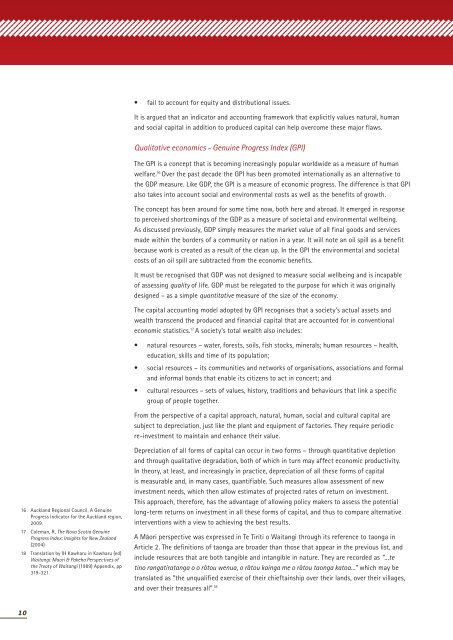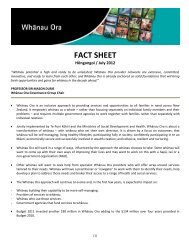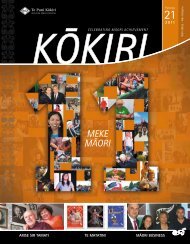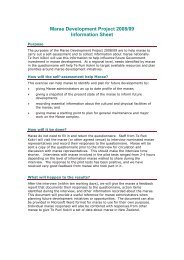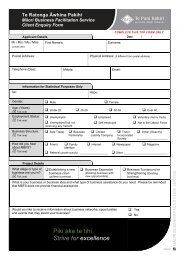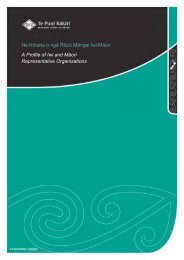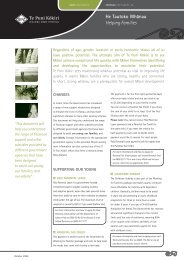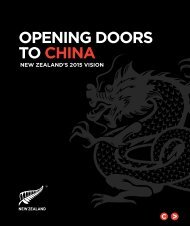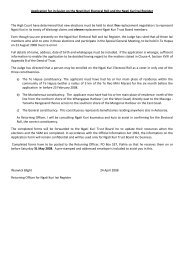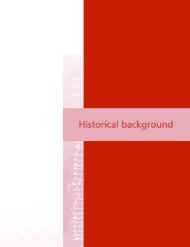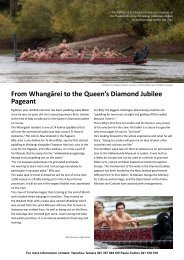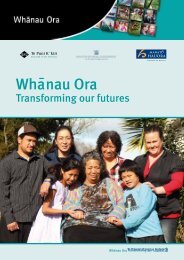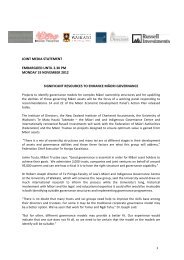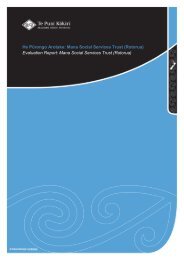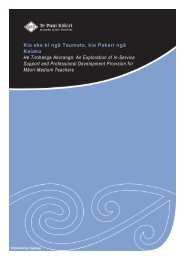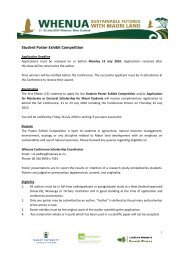He Oranga Hapori: A model for raising Maori ... - Te Puni Kokiri
He Oranga Hapori: A model for raising Maori ... - Te Puni Kokiri
He Oranga Hapori: A model for raising Maori ... - Te Puni Kokiri
- No tags were found...
Create successful ePaper yourself
Turn your PDF publications into a flip-book with our unique Google optimized e-Paper software.
• fail to account <strong>for</strong> equity and distributional issues.It is argued that an indicator and accounting framework that explicitly values natural, humanand social capital in addition to produced capital can help overcome these major flaws.Qualitative economics - Genuine Progress Index (GPI)The GPI is a concept that is becoming increasingly popular worldwide as a measure of humanwelfare. 16 Over the past decade the GPI has been promoted internationally as an alternative tothe GDP measure. Like GDP, the GPI is a measure of economic progress. The difference is that GPIalso takes into account social and environmental costs as well as the benefits of growth.The concept has been around <strong>for</strong> some time now, both here and abroad. It emerged in responseto perceived shortcomings of the GDP as a measure of societal and environmental wellbeing.As discussed previously, GDP simply measures the market value of all final goods and servicesmade within the borders of a community or nation in a year. It will note an oil spill as a benefitbecause work is created as a result of the clean up. In the GPI the environmental and societalcosts of an oil spill are subtracted from the economic benefits.It must be recognised that GDP was not designed to measure social wellbeing and is incapableof assessing quality of life. GDP must be relegated to the purpose <strong>for</strong> which it was originallydesigned – as a simple quantitative measure of the size of the economy.The capital accounting <strong>model</strong> adopted by GPI recognises that a society’s actual assets andwealth transcend the produced and financial capital that are accounted <strong>for</strong> in conventionaleconomic statistics. 17 A society’s total wealth also includes:• natural resources – water, <strong>for</strong>ests, soils, fish stocks, minerals; human resources – health,education, skills and time of its population;• social resources – its communities and networks of organisations, associations and <strong>for</strong>maland in<strong>for</strong>mal bonds that enable its citizens to act in concert; and• cultural resources – sets of values, history, traditions and behaviours that link a specificgroup of people together.From the perspective of a capital approach, natural, human, social and cultural capital aresubject to depreciation, just like the plant and equipment of factories. They require periodicre-investment to maintain and enhance their value.16 Auckland Regional Council, A GenuineProgress Indicator <strong>for</strong> the Auckland region,2009.17 Coleman, R, The Nova Scotia GenuineProgress Index: Insights <strong>for</strong> New Zealand(2004)18 Translation by IH Kawharu in Kawharu (ed)Waitangi: <strong>Maori</strong> & Pakeha Perspectives ofthe Treaty of Waitangi (1989) Appendix, pp319-321.Depreciation of all <strong>for</strong>ms of capital can occur in two <strong>for</strong>ms – through quantitative depletionand through qualitative degradation, both of which in turn may affect economic productivity.In theory, at least, and increasingly in practice, depreciation of all these <strong>for</strong>ms of capitalis measurable and, in many cases, quantifiable. Such measures allow assessment of newinvestment needs, which then allow estimates of projected rates of return on investment.This approach, there<strong>for</strong>e, has the advantage of allowing policy makers to assess the potentiallong-term returns on investment in all these <strong>for</strong>ms of capital, and thus to compare alternativeinterventions with a view to achieving the best results.A Mäori perspective was expressed in <strong>Te</strong> Tiriti o Waitangi through its reference to taonga inArticle 2. The definitions of taonga are broader than those that appear in the previous list, andinclude resources that are both tangible and intangible in nature. They are recorded as “...tetino rangatiratanga o o rätou wenua, o rätou kainga me o rätou taonga katoa...” which may betranslated as “the unqualified exercise of their chieftainship over their lands, over their villages,and over their treasures all”. 1810


